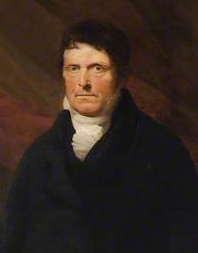| Profile | Major Works | Resources |
Edward Tatham, 1749-1834.
Oxford divine and logician, commentator on public finances.
Born in Sedberg, in theYorkshire Pennnines, son of a landed gentleman James Tatham. Edward Tatham was educated at a local grammar school, where he was given a thorough training in the classics by Rev. Wynne Bateman, proceeded to enroll in Queen's College Oxford in 1769. He graduated in 1774 and M.A. in 1776. Tatham took up priestly orders in the Church of England in 1778 and was appointed to parish of Banbury, sufficiently nearby to allow him to maintain his residence at Oxford.
In 1780, Tatham published his Twelve Discourses" on divinity. In 1781 Tatham was elected fellow of Lincoln College, Oxford and became a popular tutor. In 1789, Tatham was selected to deliver the prestigious Bampton Lectures on theology at Oxford, choosing the topic of the congruity of logic and religion. A two-volume expansion of the Bampton lectures were published as the Chart and Scale of Truth (1790-92; they were further expanded posthumously in 1840). Here, Tatham sets out a common system of logic, which he identifies as emanating from the Divine mind, showing how it pervades all fields of science and inquiry. Delivered during the outbreak of the French Revolution, Tatham positions himself carefully as a champion of the Enlightenment, defending the rationalism of the 18th C., despite its suspicious association with the irreligious skepticism and the subversive revolutionary ideas of Hume, Paine and the French philosophes. Tatham emphasized the congruity of scientific philosophy with received religion, and asserted that the established church and institutions of Britain had little to fear from rationalism per se, provided it is properly handled. He encouraged the Oxford community to bring these topics into the university curriculum, to embrace and re-mould them in congruity with Christian principles, rather than exclude them and abdicate any influence over their development, leaving rational philosophy and the sciences in the hands of anti-religious figures, to be twisted and misused against the Church and State. Tatham's effort to reconcile scientific philosophy with received religion were praised by Thomas Reid. The Chart and Scale made Tatham's reputation, and was arguably the most influential book on logic written in English before the appearance of Whately's Elements in 1823.
As the French Revolution radicalized, Tatham, like many other British contemporaries, turned against it. Tatham published two open letters decrying it - one directed against the radical English Revolution Society, and another in support of Edmund Burke, praising and reinforcing his recently-published Reflections in 1791. Later that same year, Tatham composed a sermon on the anniversary of the Gunpowder Plot.
In March 1792, Tatham was elected Rector of Lincoln College, replacing the late John Horner, and married in 1801.
Tatham dabbled on economic and public finance matters during the Pitt ministry of the 1790s. Tatham's first open letter to Pitt (1795) connected the national public debt with rising British prosperity ("instead of national evil, but a national good"). His second letter (1797) second letter argued for the establishment of a national bank to increase circulation and thus trade, were both very criticized. Tatham would later credit himself (without modesty) as responsible for Pitt's introduction of an income tax in 1799. Tatham was also an occasional commentator on the later Bullionist controversy, writing works on the scarcity of money (1816) and the metallic standard (1820)..
At Lincoln, Tatham continued to be a tireless advocate of curricular reform at Oxford, albeit not always seeing eye-to-eye with fellow reformers, like John Eveleigh and Edward Copleston at Oriel. Tatham authored a series of addresses, from 1807 to 1811, collected in Oxonia Purgata (1811), protesting the reduction of the Oxford examination to Aristotlean logic at the expense of other disciplines.
|
Major Works of Edward Tatham
|
|
HET
|
|
Resources on George Tatham
|
All rights reserved, Gonšalo L. Fonseca

